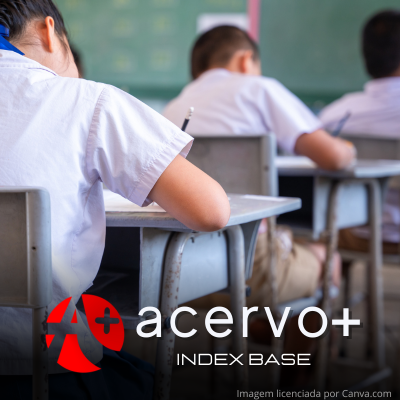Educação em saúde na escola sob a ótica da equipe pedagógica: das necessidades às estratégias
##plugins.themes.bootstrap3.article.main##
Resumo
Objetivo: Analisar as concepções de uma equipe pedagógica acerca das ações educativas desenvolvidas no cenário escolar com a participação de uma equipe interprofissional de saúde. Métodos: Foi desenvolvido em uma Escola de Ensino Fundamental da região central do Rio Grande do Sul, juntamente aos membros da equipe pedagógica do local, no segundo semestre do ano de 2019, de forma complementar a ações periódicas de educação em saúde. A técnica de coleta de dados utilizada foi o grupo focal. Os dados foram submetidos à Análise Textual Discursiva. Resultados: A equipe reconheceu a necessidade de ação, principalmente em relação ao cuidado corporal, alimentação e saúde mental. A equipe atua por meio da supervisão diária, porém de forma não sistematizada. As ações da equipe de saúde foram consideradas importantes por complementar à educação escolar, proporcionando vinculação da escola com o sistema de saúde municipal, bem como o acesso dos escolares à atenção à saúde. Conclusão: A equipe pedagógica pôde ampliar a consciência situacional em relação a área da saúde, assim como a equipe de saúde pôde repensar as ações para atender as demandas da escola.
##plugins.themes.bootstrap3.article.details##
Copyright © | Todos os direitos reservados.
A revista detém os direitos autorais exclusivos de publicação deste artigo nos termos da lei 9610/98.
Reprodução parcial
É livre o uso de partes do texto, figuras e questionário do artigo, sendo obrigatória a citação dos autores e revista.
Reprodução total
É expressamente proibida, devendo ser autorizada pela revista.
Referências
2. BRASIL. Decreto nº 6.286, de 05 de dezembro de 2007. Institui o Programa Saúde na Escola - PSE, e dá outras providências. Diário Oficial da União, Brasília, DF. 2007. Disponível em: https://www.planalto.gov.br/ccivil_03/_ato2007-2010/2007/decreto/d6286.htm. Acessado em 29 de dezembro de 2019.
3. BRASIL. Caderno do gestor do PSE. Brasília, Ministério da Saúde. 2015; 1: 68.
4. BRASIL. Lei nº 13.722, de 4 de outubro de 2018. Diário oficial da união. Brasília, DF. 2018. Disponível em: https://legis.senado.leg.br/norma/30228750/publicacao/30228784. Acessado em 29 de dezembro de 2019.
5. BYRNE J, et al. Teachers as health promoters: Factors that influence early career teachers to engage with health and wellbeing education. Teaching and Teacher Education. 2018; 69: 289–299.
6. CAMPOS L, et al. Is it possible to “Find space for mental health” in young people? Effectiveness of a school-based mental health literacy promotion program. International Journal of Environmental Research and Public Health. 2018; 15(7).
7. CARVALHO FFB. A saúde vai à escola: A promoção da saúde em práticas pedagógicas. Physis. 2015; 25(4), 1207–1227.
8. COLOMÉ, JC. et al. Análise Focal Estratégica como possibilidade metodológica nas pesquisas qualitativas. In: BACKES. D.S.; ILHA, S.; COLOME, J. C. Evidências Empreendedoras na Enfermagem: Ensino, Pesquisa e Extensão. Santa Maria: Universidade Franciscana. 2019; 56-6.
9. FREITAS ASS, et al. Obesidade infantil: influência de hábitos alimentares inadequados. Saúde & Ambiente em Revista. 2009; 4(42): 9–14.
10. LAI ESY, et al. The effectiveness and sustainability of a universal school-based programme for preventing depression in Chinese adolescents: A follow-up study using quasi-experimental design. PLoS ONE. 2016; 11(2): 1–20.
11. LENTHE FJ, et al. Understanding socio-economic inequalities in food choice behaviour: Can Maslow’s pyramid help? British Journal of Nutrition. 2015; 113(7): 1139–1147.
12. MARTINS HHTS. Metodologia qualitativa de pesquisa. Educação e Pesquisa. 2004; 30(2): 289–300.
13. MELO KM, et al. Influence of parents’ behavior during the meal and on overweight in childhood. Escola Anna Nery. 2017; 21(4): 1–6.
14. MORAES R, GALIAZZI M. Análise Textual Discursiva, Ijuí: Editora Unijuí. 2016; 3: 264.
15. MORIN E. Seven complex lessons in education for the future. PUF – Paris, Fance. 2001; 95.
16. POSTON B. An Exercise in Personal Exploration: Maslow’s Hierarchy of Needs. The Surgical Technologist. 2009; 41(8): 347–353.
17. QUEIROZ FS, et al. Qualidade de vida de crianças pré-escolares e sua relação com a cárie dentária e fatores sociodemográficos. Arch Health Invest. 2021; 10(7): 1090-1098.
18. ROSSEN E, COWAN K. Improving mental health in schools. Phi Delta Kappan. 2017; 96(4): 8–13.
19. RUMOR PCF, et al. Programa Saúde na Escola: potencialidades e limites da articulação intersetorial para promoção da saúde infantil. Saúde Debate. 2022; 46(3): 116-128.
20. TAN HJR, et al. Effects of a school-based substance use prevention program on students in Malaysia. Journal of Health and Translational Medicine. 2018; 21(1): 40–46.
21. THOMAS RE, et al. Effectiveness of school-based smoking prevention curricula: Systematic review and meta-analysis. BMJ Open. 2015; 5(3).

